The document provides an overview of the ZIO library, which provides purely functional data structures and abstractions for effectful programs using monads. It describes ZIO's IO data type, which represents effectful programs that may fail, run forever, or produce a value. It also covers ZIO concepts like Refs (immutable references), Promises (asynchronous values that can be set once), and Queues (asynchronous FIFO queues for producers and consumers).



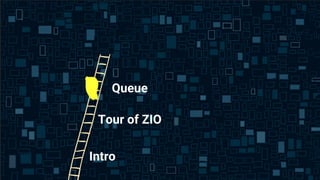


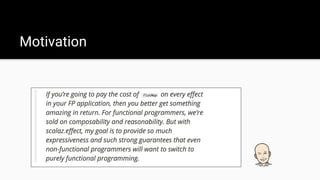
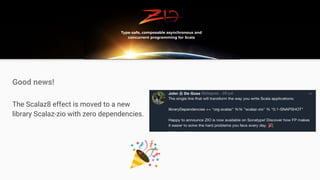
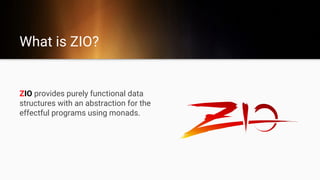
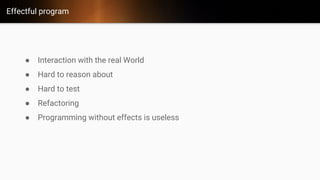
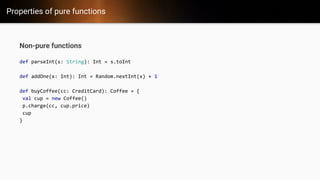
![Properties of pure functions
Non-pure functions
def parseInt(s: String): Int = s.toInt
def addOne(x: Int): Int = Random.nextInt(x) + 1
def buyCoffee(cc: CreditCard): Coffee = {
val cup = new Coffee()
p.charge(cc, cup.price)
cup
}
parseInt("Hello!")
[error] java.lang.NumberFormatException:
For input string: "Hello!"
NOT TOTAL!](https://image.slidesharecdn.com/milan-scala-group-ioqueue-4-190120121237/85/ZIO-Queue-12-320.jpg)
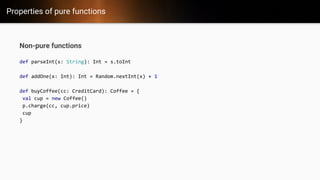
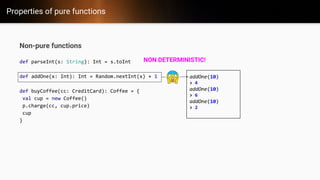
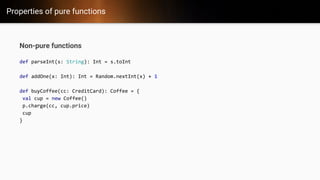
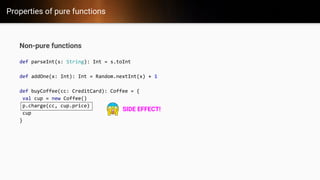
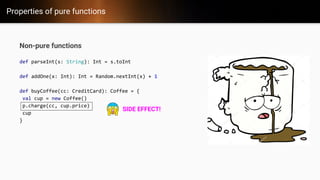
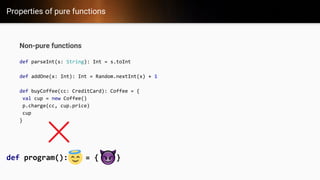
![Properties of pure functions
Non-pure functions
def parseInt(s: String): Int = s.toInt
def addOne(x: Int): Int = Random.nextInt(x) + 1
def buyCoffee(cc: CreditCard): Coffee = {
val cup = new Coffee()
p.charge(cc, cup.price)
cup
}
Pure functions
def parseInt(s: String): Option[Int] =
Try(s.toInt).toOption
def addOne(x: Int): Int = x + 1
def buyCoffee(cc: CreditCard): (Coffee, Charge) = {
val cup = new Coffee()
(cup, Charge(cc, cup.price))
}
def program(): = { }](https://image.slidesharecdn.com/milan-scala-group-ioqueue-4-190120121237/85/ZIO-Queue-19-320.jpg)
![Properties of pure functions
Pure functions
def parseInt(s: String): Option[Int] =
Try(s.toInt).toOption
def addOne(x: Int): Int = x + 1
def buyCoffee(cc: CreditCard): (Coffee, Charge) =
{
val cup = new Coffee()
(cup, Charge(cc, cup.price))
}
Non-pure functions
def parseInt(s: String): Int = s.toInt
def addOne(x: Int): Int = Random.nextInt(x) + 1
def buyCoffee(cc: CreditCard): Coffee = {
val cup = new Coffee()
p.charge(cc, cup.price)
cup
}
def program(): = { } def program(): = { }](https://image.slidesharecdn.com/milan-scala-group-ioqueue-4-190120121237/85/ZIO-Queue-20-320.jpg)


![What is IO[E, A] ?
IO is an immutable data structure that describes an
effectful program that may:
● fail with an E
● run forever
● produce a single A](https://image.slidesharecdn.com/milan-scala-group-ioqueue-4-190120121237/85/ZIO-Queue-23-320.jpg)
![What is IO[E, A] ?
parseInt("hello") //fails with NumberFormatExceptionIO.syncException(parseInt(str))](https://image.slidesharecdn.com/milan-scala-group-ioqueue-4-190120121237/85/ZIO-Queue-24-320.jpg)
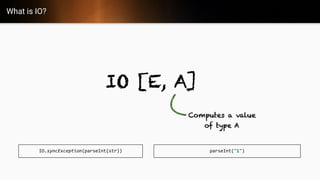
![What is IO[E, A] ?
println("Hello!")IO.sync(println("Hello!")](https://image.slidesharecdn.com/milan-scala-group-ioqueue-4-190120121237/85/ZIO-Queue-26-320.jpg)
![What is IO[E, A] ?
throw new Exception("error")IO.fail(new Exception("error"))](https://image.slidesharecdn.com/milan-scala-group-ioqueue-4-190120121237/85/ZIO-Queue-27-320.jpg)
![What is IO[E, A] ?
while(true) {}IO.never](https://image.slidesharecdn.com/milan-scala-group-ioqueue-4-190120121237/85/ZIO-Queue-28-320.jpg)
![IO[E, A] structure
trait IO[E, A] { self =>
def map[B](f: A => B): IO[E, B]
def flatMap[E, B](f0: A => IO[E, B]): IO[E, B]
...
}
object IO {
def fail[E](error: E): IO[E, Nothing] = ???
def now[A](a: A): IO[Nothing, A] = ???
...
}
IO[E, A]](https://image.slidesharecdn.com/milan-scala-group-ioqueue-4-190120121237/85/ZIO-Queue-29-320.jpg)
![IO Effects
IO describes the following effects:
● Pure Values
val number: Int= 1
val number: IO[Nothing, Int] = IO.now(1)](https://image.slidesharecdn.com/milan-scala-group-ioqueue-4-190120121237/85/ZIO-Queue-30-320.jpg)
![IO Effects
IO describes the following effects:
● Pure Values
● Synchronous Effect
println("hello")
val putStrLn: IO[Nothing, Unit] =
IO.sync(println("hello"))](https://image.slidesharecdn.com/milan-scala-group-ioqueue-4-190120121237/85/ZIO-Queue-31-320.jpg)
![IO Effects
IO describes the following effects:
● Pure Values
● Synchronous Effect
parseInt("hello")
val toInt: IO[Throwable, Int] =
IO.syncThrowable(parseInt("hello"))](https://image.slidesharecdn.com/milan-scala-group-ioqueue-4-190120121237/85/ZIO-Queue-32-320.jpg)
![IO Effects
IO describes the following effects:
● Pure Values
● Synchronous Effect
parseInt("hello")
val toInt: IO[Exception, Int] =
IO.syncException(parseInt("hello"))](https://image.slidesharecdn.com/milan-scala-group-ioqueue-4-190120121237/85/ZIO-Queue-33-320.jpg)
![IO Effects
IO describes the following effects:
● Pure Values
● Synchronous Effect
parseInt("hello")
val toInt: IO[String, Int] =
IO.syncCatch(parseInt("hello")){
case e: NumberFormatException => "oh no!"
}](https://image.slidesharecdn.com/milan-scala-group-ioqueue-4-190120121237/85/ZIO-Queue-34-320.jpg)
))](https://image.slidesharecdn.com/milan-scala-group-ioqueue-4-190120121237/85/ZIO-Queue-35-320.jpg)
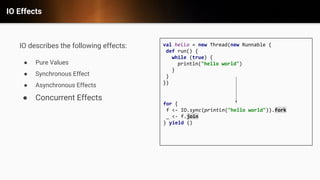
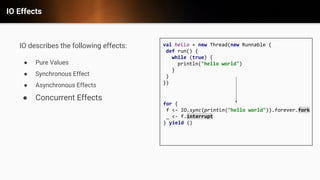
)
(f => closeFile(f))(f => compute(f))](https://image.slidesharecdn.com/milan-scala-group-ioqueue-4-190120121237/85/ZIO-Queue-38-320.jpg)
![Usage of IO
In ZIO, every type has specific
features to solve different problems.
Each type is wrapped inside an IO.
Promise[E, A]
Ref[A]
Queue[A]
IO[E, A]](https://image.slidesharecdn.com/milan-scala-group-ioqueue-4-190120121237/85/ZIO-Queue-39-320.jpg)
![RTS: IO runtime system
IO is interpreted by the IO runtime system into
effectful interactions with the external world.
● unsafeRun
● In your application’s main function (App
provides this functionality automatically).
def main(args: Array[String]): Unit =
println("Hello")
def main(args: Array[String]): Unit =
unsafeRun(IO.sync(println("Hello")))](https://image.slidesharecdn.com/milan-scala-group-ioqueue-4-190120121237/85/ZIO-Queue-40-320.jpg)
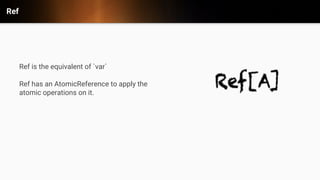
![Ref
Ref[A]
object Ref {
def apply[A](a: A): IO[Nothing, Ref[A]] = ???
}
trait Ref[A] {
def get: IO[Nothing, A]
def set(a: A): IO[Nothing, Unit]
def update(f: A => A): IO[Nothing, A]
def modify[B](f: A => (B, A)): IO[Nothing, B]
}](https://image.slidesharecdn.com/milan-scala-group-ioqueue-4-190120121237/85/ZIO-Queue-42-320.jpg)
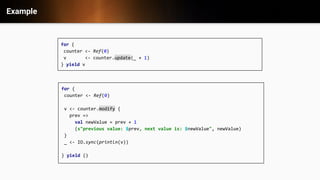
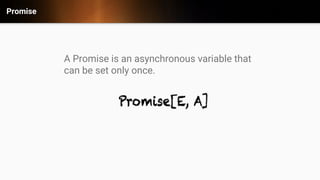
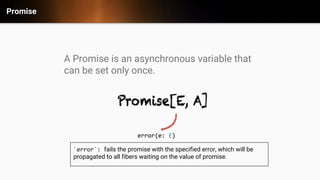
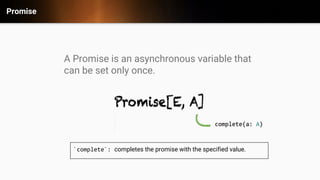
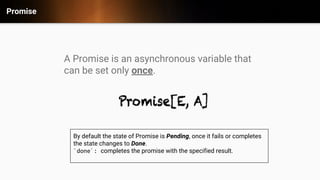
![Promise
trait Promise[E, A] {
def get: IO[E, A]
def complete(a: A): IO[Nothing, Boolean]
def error(e: E): IO[Nothing, Boolean]
def interrupt(t: Throwable): IO[Nothing, Boolean]
def done(r: ExitResult[E, A]): IO[Nothing, Boolean]
}
Promise[E, A]
object Promise {
def make[E, A]: IO[Nothing, Promise[E, A]] = ???
}](https://image.slidesharecdn.com/milan-scala-group-ioqueue-4-190120121237/85/ZIO-Queue-48-320.jpg)

![Promise: Example
(for {
p <- Promise.make[Nothing, String]
_ <- p.complete(s"Your reminder for ${friend.name} birthday")
.delay(minus(LocalDate.now, friend.birthday))
.fork
msg <- p.get
} yield sendAlert(msg)).fork
20.12.2018](https://image.slidesharecdn.com/milan-scala-group-ioqueue-4-190120121237/85/ZIO-Queue-50-320.jpg)


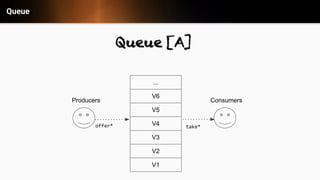
![trait Queue[A] {
def take: IO[Nothing, A]
def takeAll: IO[Nothing, List[A]]
def takeUpTo(max: Int): IO[Nothing, List[A]]
def offer(a: A): IO[Nothing, Boolean]
def offerAll(as: Iterable[A]): IO[Nothing, Boolean]
}
object Queue {
def bounded[A](capacity: Int): IO[Nothing, Queue[A]]
def unbounded[A]: IO[Nothing, Queue[A]]
def sliding[A](capacity: Int): IO[Nothing, Queue[A]]
def dropping[A](capacity: Int): IO[Nothing, Queue[A]]
}
Queue[A]
Queue](https://image.slidesharecdn.com/milan-scala-group-ioqueue-4-190120121237/85/ZIO-Queue-54-320.jpg)
![Takers
take
Consumers
for {
queue <- Queue.unbounded[String]
v1 <- queue.take.fork](https://image.slidesharecdn.com/milan-scala-group-ioqueue-4-190120121237/85/ZIO-Queue-55-320.jpg)
![Takers
take
take
Consumers
for {
queue <- Queue.unbounded[String]
v1 <- queue.take.fork
v2 <- queue.take.fork](https://image.slidesharecdn.com/milan-scala-group-ioqueue-4-190120121237/85/ZIO-Queue-56-320.jpg)
![Takers
take
take
Consumers
for {
queue <- Queue.unbounded[String]
v1 <- queue.take.fork
v2 <- queue.take.fork
_ <- queue.offer("hello").fork
“hello”
Producers](https://image.slidesharecdn.com/milan-scala-group-ioqueue-4-190120121237/85/ZIO-Queue-57-320.jpg)
![Takers
take
take
Consumers
for {
queue <- Queue.unbounded[String]
v1 <- queue.take.fork
v2 <- queue.take.fork
_ <- queue.offer("hello").fork
_ <- queue.offer("bye").fork
Producers
“hello”
“bye”](https://image.slidesharecdn.com/milan-scala-group-ioqueue-4-190120121237/85/ZIO-Queue-58-320.jpg)
![Takers
take
take
Consumers
for {
queue <- Queue.unbounded[String]
v1 <- queue.take.fork
v2 <- queue.take.fork
_ <- queue.offer("hello").fork
_ <- queue.offer("bye").fork
Producers
“bye”
“hello”](https://image.slidesharecdn.com/milan-scala-group-ioqueue-4-190120121237/85/ZIO-Queue-59-320.jpg)
![Takers
Consumers
for {
queue <- Queue.unbounded[String]
v1 <- queue.take.fork
v2 <- queue.take.fork
_ <- queue.offer("hello").fork
_ <- queue.offer("bye").fork
} yield ()
Producers
“hello”
“bye”](https://image.slidesharecdn.com/milan-scala-group-ioqueue-4-190120121237/85/ZIO-Queue-60-320.jpg)
](https://image.slidesharecdn.com/milan-scala-group-ioqueue-4-190120121237/85/ZIO-Queue-61-320.jpg)

_ <- queue.offer("a").fork
_ <- queue.offer("b").fork
_ <- queue.offer("c").fork
_ <- queue.offer("d").fork](https://image.slidesharecdn.com/milan-scala-group-ioqueue-4-190120121237/85/ZIO-Queue-62-320.jpg)

_ <- queue.offer("a").fork
_ <- queue.offer("b").fork
_ <- queue.offer("c").fork
_ <- queue.offer("d").fork](https://image.slidesharecdn.com/milan-scala-group-ioqueue-4-190120121237/85/ZIO-Queue-63-320.jpg)

_ <- queue.offer("a").fork
_ <- queue.offer("b").fork
_ <- queue.offer("c").fork
_ <- queue.offer("d").fork
v1 <- queue.take.fork
“c”
“b”
“a”](https://image.slidesharecdn.com/milan-scala-group-ioqueue-4-190120121237/85/ZIO-Queue-64-320.jpg)

_ <- queue.offer("a").fork
_ <- queue.offer("b").fork
_ <- queue.offer("c").fork
_ <- queue.offer("d").fork
v1 <- queue.take.fork](https://image.slidesharecdn.com/milan-scala-group-ioqueue-4-190120121237/85/ZIO-Queue-65-320.jpg)

_ <- queue.offer("a").fork
_ <- queue.offer("b").fork
_ <- queue.offer("c").fork
_ <- queue.offer("d").fork
v1 <- queue.take.fork
} yield ()](https://image.slidesharecdn.com/milan-scala-group-ioqueue-4-190120121237/85/ZIO-Queue-66-320.jpg)

_ <- queue.offer("A") //(1)
} yield ()](https://image.slidesharecdn.com/milan-scala-group-ioqueue-4-190120121237/85/ZIO-Queue-67-320.jpg)

_ <- queue.offer("A") //(1)
_ <- queue.offer("B") //(2)
} yield ()](https://image.slidesharecdn.com/milan-scala-group-ioqueue-4-190120121237/85/ZIO-Queue-68-320.jpg)

_ <- queue.offer("A") //(1)
_ <- queue.offer("B") //(2)
_ <- queue.offer("C") //(3)
} yield ()](https://image.slidesharecdn.com/milan-scala-group-ioqueue-4-190120121237/85/ZIO-Queue-69-320.jpg)

_ <- queue.offer("A") //(1)
_ <- queue.offer("B") //(2)
_ <- queue.offer("C") //(3)
_ <- queue.offer("D") //(4)
} yield ()](https://image.slidesharecdn.com/milan-scala-group-ioqueue-4-190120121237/85/ZIO-Queue-70-320.jpg)

_ <- queue.offer("A") //(1)
_ <- queue.offer("B") //(2)
_ <- queue.offer("C") //(3)
_ <- queue.offer("D") //(4)
} yield ()](https://image.slidesharecdn.com/milan-scala-group-ioqueue-4-190120121237/85/ZIO-Queue-71-320.jpg)

_ <- queue.offer("A") //(1)
} yield ()](https://image.slidesharecdn.com/milan-scala-group-ioqueue-4-190120121237/85/ZIO-Queue-72-320.jpg)

_ <- queue.offer("A") //(1)
_ <- queue.offer("B") //(2)
} yield ()](https://image.slidesharecdn.com/milan-scala-group-ioqueue-4-190120121237/85/ZIO-Queue-73-320.jpg)

_ <- queue.offer("A") //(1)
_ <- queue.offer("B") //(2)
_ <- queue.offer("C") //(3)
} yield ()](https://image.slidesharecdn.com/milan-scala-group-ioqueue-4-190120121237/85/ZIO-Queue-74-320.jpg)

_ <- queue.offer("A") //(1)
_ <- queue.offer("B") //(2)
_ <- queue.offer("C") //(3)
_ <- queue.offer("D") //(4)
} yield ()](https://image.slidesharecdn.com/milan-scala-group-ioqueue-4-190120121237/85/ZIO-Queue-75-320.jpg)

_ <- queue.offer("A") //(1)
_ <- queue.offer("B") //(2)
_ <- queue.offer("D") //(4)
} yield ()](https://image.slidesharecdn.com/milan-scala-group-ioqueue-4-190120121237/85/ZIO-Queue-76-320.jpg)
![Shutdown
for {
queue <- Queue.unbounded[String]
_ <- queue.offer("A").forever.fork
_ <- queue.take.forever.fork
} yield ()](https://image.slidesharecdn.com/milan-scala-group-ioqueue-4-190120121237/85/ZIO-Queue-77-320.jpg)
![Shutdown
for {
queue <- Queue.unbounded[String]
_ <- queue.offer("A").forever.fork
_ <- queue.take.forever.fork
_ <- queue.shutdown
} yield ()](https://image.slidesharecdn.com/milan-scala-group-ioqueue-4-190120121237/85/ZIO-Queue-78-320.jpg)
![Shutdown
for {
queue <- Queue.unbounded[String]
_ <- queue.offer("A").forever.fork
_ <- queue.take.forever.fork
_ <- queue.shutdown
} yield ()](https://image.slidesharecdn.com/milan-scala-group-ioqueue-4-190120121237/85/ZIO-Queue-79-320.jpg)



